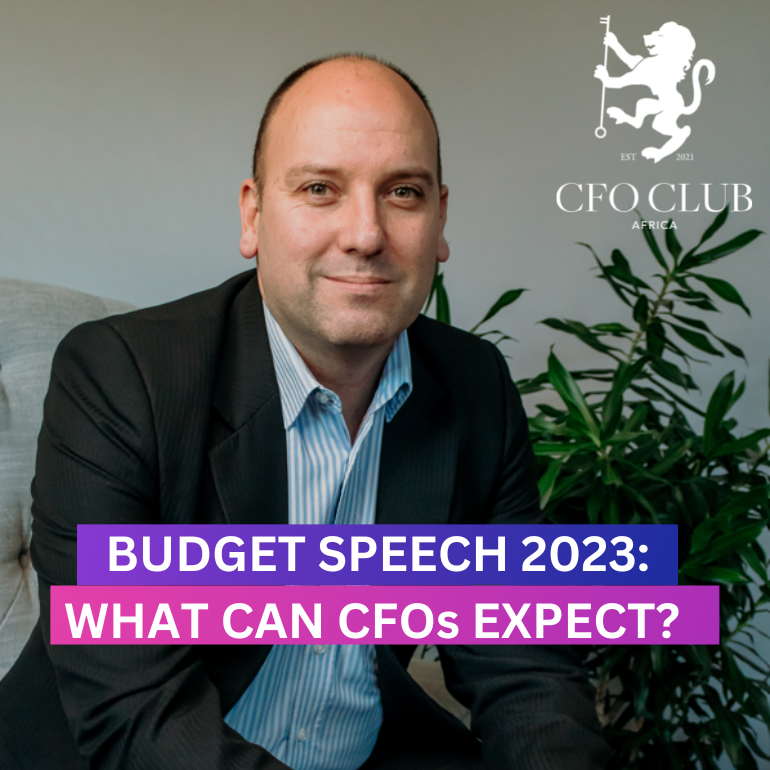By Jeff Ryan, MD of AWCape, a Platinum Sage business partner for HR, payroll and financial solutions
South Africa’s Budget Speech for 2023 is an eagerly anticipated event for CFOs and financial leaders alike, as it provides insight into the government’s economic priorities and plans for the year ahead.
This year, however, South Africa’s economy is facing significant challenges, including high unemployment rates, continued inflation, rising interest rates, poor growth outlook, and rising debt levels. And to top all of this, the loadshedding crisis we are experiencing is adding another level of strain to growing businesses that are trying to keep their businesses afloat.
As such, the 2023 Budget Speech is likely to be focused on addressing these issues and improving the country’s economic prospects.
Revenue Collection
One key area that CFOs should pay attention to is the government’s plans for revenue collection. Most analysts agree that it is unlikely that an income tax increase will be well received and only likely to cause a further brain drain of the already diminished tax base.
As a result, it is likely the government is likely to look for ways to increase its revenue through indirect taxes like the fuel levy or sin taxes for alcohol and tobacco products to fund critical spending initiatives.
Another focus area will be the use of technology to be more effective in tax collection. SARS has already announced its Vision 2024 embracing technology specifically artificial intelligence, to ease the burden of detecting non-compliance amongst taxpayers. And simultaneously, making full use of quick access to tax information from across the globe.
This will make it near impossible for taxpayers to hold undisclosed offshore interests. If caught, the taxpayer will face a dual audit with the active participation of both SARS and the revenue overseas authority where the assets are situated.
What is not clear, is what government plans for business tax. When speaking to our customers, we are hearing that loadshedding is having a crippling effect on their economic activity. The SONA announcements seem to finally acknowledge this and the potential changes and focus on renewable energies are very welcome.
Specifically declaring a national state of disaster gives the government additional powers to respond to a crisis, including permitting emergency procurement procedures with fewer bureaucratic delays and less oversight. Also appointing a minister of electricity in the Presidency is a right step to elevate and manage this crisis effectively.
Unfortunately, the South African Reserve Bank recently downwardly revised the growth outlook to a mere 0.3%. The current situation in SA is just too much for the average consumer and business owner who is already struggling to keep their business going.
It is my recommendation that corporate tax rates should be significantly reduced in these circumstances. The rationale being a lower corporate tax burden for businesses will enable them to invest and grow in their businesses. This results in greater profitability and subsequently increased employment. This increased employment leads to a greater income tax base, which increases the overall tax collected.
Correctly managed and implemented, this would more than likely replace the short-term loss on corporate taxes. Particularly, if targeted at small businesses that employ two-thirds of the world’s population. And the results for SA would be even better, if the tax burden is further reduced by those firms that are 100% South African (both employees employed and goods / raw materials purchased).
However, the current government has never indicated a “radical” / different approach to taxes, so a status quo policy will likely be maintained. Although the mention of tax incentives for businesses and households that install solar panels at SONA was a positive step in the right direction. Let’s hope for more thinking in this vein.
Overall I hope that the government doesn’t prioritize revenue collection over the well-being of its citizens, and avoids increasing VAT to combat the current energy crisis. This could have disastrous consequences, particularly for the 43% unemployed and small businesses that drive growth.
Spending Plans
Another area well-watched by CFOs is the government’s spending plans. The 2023 Budget Speech will outline how much money the government plans to allocate to various sectors, including healthcare, education, infrastructure and our energy situation.
CFOs should look out for any increases in spending in these areas. This could lead to opportunities by targeting different sectors or budgeting for higher costs in sectors not being supported.
We are helping many of our customers with this by providing a solution that gives real-time dashboards on current spending, and more importantly, consolidated planning and forecasting tools. These solutions are enabling our customers to quickly adjust forecasts and budgets based on input such as the Budget Speech, and changes in interest rates or exchange rates.
On a macro level, 2023 marks seven years left for the country to realise the National Development Plan goals. An important part of this was the creation of a “capable state” and 11-million jobs. I would hope that there is a serious consideration for selling off loss-leading SOE to private enterprises to ensure the success and growth of some of these. Again, hopefully, the acceptance of private electricity providers for Eskom’s failures might help ease the transition of other SOEs.
Unfortunately, this is unlikely in the short term, and further allocation of funds without structured plans for recovery to these deeply indebted, inefficient SOEs will put the economy in a worse situation and prevent growth.
Lastly, we are hoping to hear the government’s plan focused on regulation and red tape reduction. Recently South Africa has faced criticism for its complex and bureaucratic regulatory environment, which has made it difficult for businesses to operate effectively (or foreigners to invest). We hope to hear how the government will simplify these regulations.

